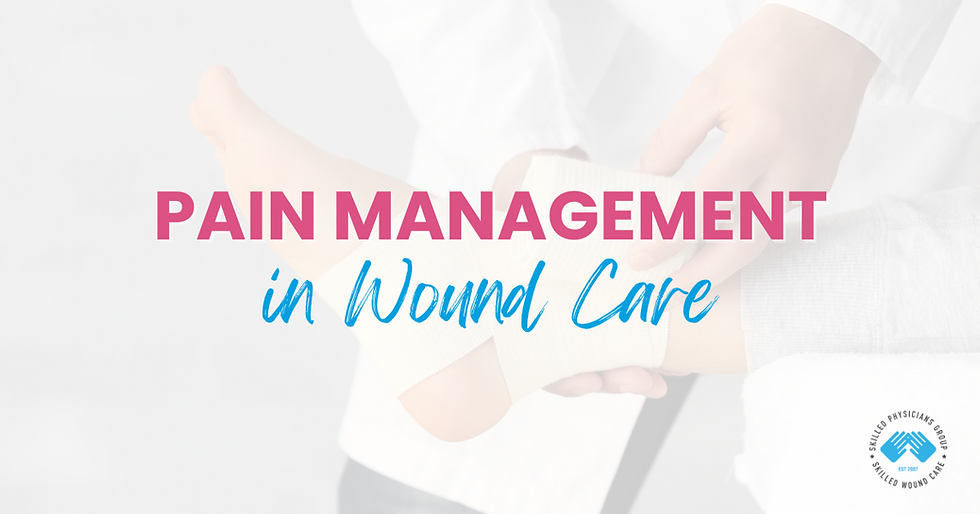Pain Management in Wound Care
- Skilled Wound Care

- May 6, 2024
- 3 min read
Effective pain management is a cornerstone of compassionate, comprehensive wound care. For physicians, understanding and implementing pain control strategies is essential not only for improving patient outcomes but also for enhancing quality of life during the wound healing process. This blog digs into the complexities of pain management in wound care, exploring the latest techniques and how they integrate into overall treatment plans.
Understanding Pain in Wound Care
Pain is a common and significant symptom associated with both acute and chronic wounds. It can arise from the initial trauma, the wound itself, or the interventions employed during treatment. Chronic wounds, such as diabetic ulcers, pressure ulcers, and venous leg ulcers, can be particularly challenging as they may persist for extended periods, causing ongoing discomfort and distress.
Challenges in Wound-Related Pain Management
Effective pain management requires a multidimensional approach, tailored to individual patient needs. Here are some of the challenges physicians face:
1. Assessment of Pain:
Pain is subjective and varies widely among individuals. Accurate assessment is crucial and involves both the patient’s description and the use of validated pain assessment tools. These tools help quantify pain levels and the efficacy of pain management strategies over time.
2. Multifactorial Nature of Pain:
Wound pain can be influenced by various factors including the wound etiology, location, and the presence of infection. Comorbid conditions such as diabetes or vascular disease can exacerbate the perception of pain, complicating management strategies.
3. Balancing Pain Management with Wound Healing:
Some pain management techniques, such as the use of certain medications, can potentially interfere with wound healing processes. For instance, nonsteroidal anti-inflammatory drugs (NSAIDs) can affect inflammation, a critical component of the healing process.
Advanced Pain Management Techniques
1. Pharmacological Approaches:
Includes the use of topical analgesics, local anesthetics, systemic analgesics, and occasionally, opioids for severe pain. Each class of drug is chosen based on the pain severity, patient history, and the potential impact on wound healing.
2. Non-Pharmacological Methods:
Techniques such as cold therapy, electrical stimulation, and acupuncture have been employed to reduce pain without the side effects associated with drugs. Psychological support, including counseling and therapy, can also play a role in managing the emotional components of chronic wound pain.
3. Integrated Care Approaches:
Employing a team of multidisciplinary professionals including pain specialists, wound care nurses, and physical therapists can enhance pain management outcomes. This approach ensures comprehensive treatment plans that address all aspects of wound care and patient well-being.
4. Personalized Pain Management Plans:
Creating a personalized plan that considers the patient’s overall health, lifestyle, and preferences is crucial. This includes regular review and adjustment of pain management strategies to adapt to changes in wound condition and patient response.
The Role of Physicians in Pain Management
Physicians specializing in wound care need to stay informed about the latest advancements in pain management. Continuous education and training in emerging pain control techniques are vital for enhancing patient care. Understanding the interaction between pain management and wound healing dynamics is critical for optimizing both outcomes.
Opportunities in Wound Care and Pain Management
Specializing in wound care offers physicians the opportunity to engage deeply with their patients, addressing both the physical and psychological aspects of wound management. For those interested in this field, there is substantial room for growth and specialization, particularly in integrating pain management into treatment protocols.
At Skilled Wound Care, we recognize the importance of effective pain management in improving patient outcomes and quality of life. We are committed to providing our team with the resources and support needed to excel in this challenging yet rewarding field. If you are a physician looking for opportunities to specialize in wound care and pain management, we invite you to learn more about our fellowship programs and open positions.
For more information, visit Skilled Wound Care or reach out to our recruitment team. Join us in making a significant impact on patient care through cutting-edge treatments and compassionate, holistic care approaches. Together, we can transform the landscape of wound management and pain control.





Comments